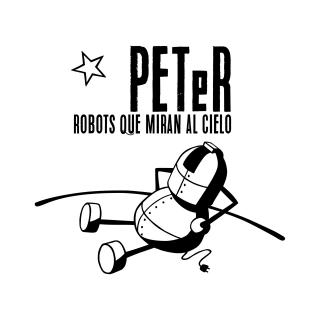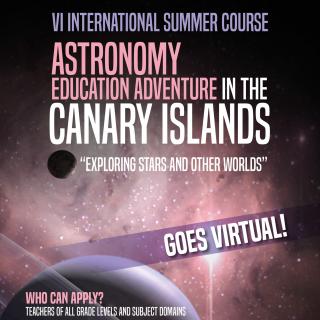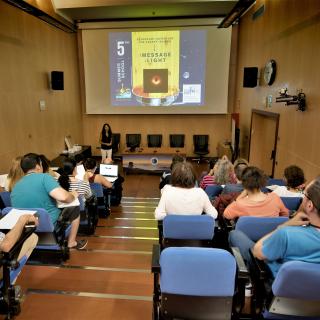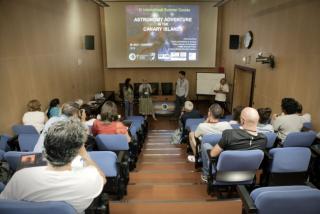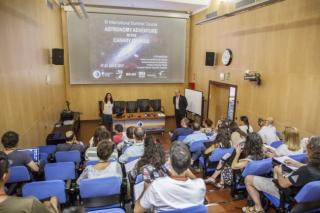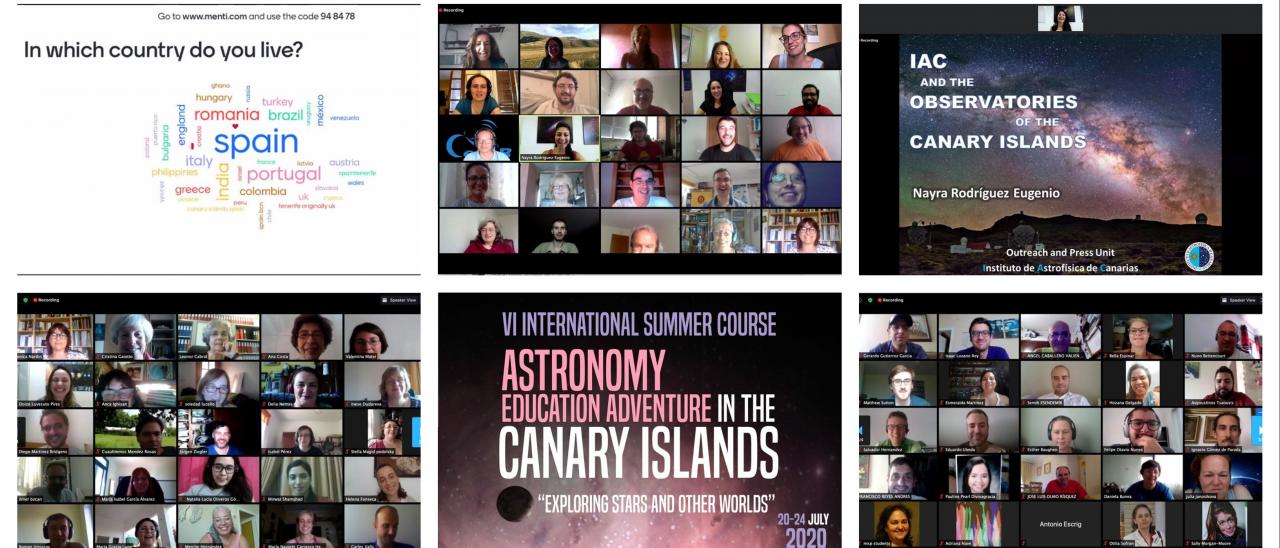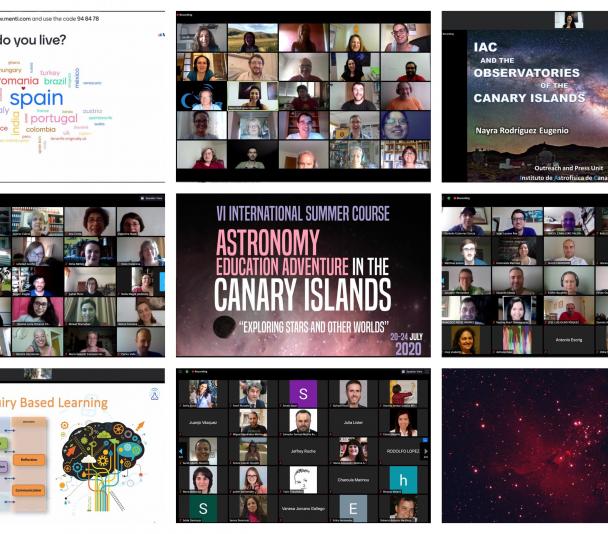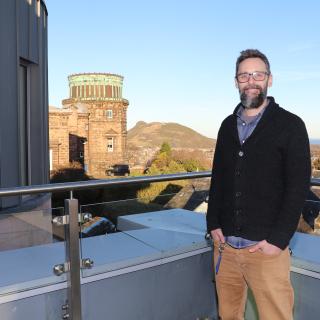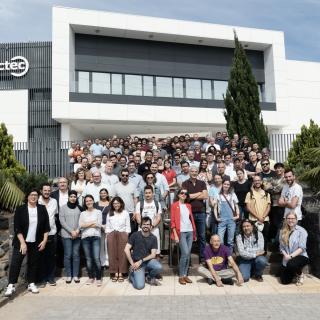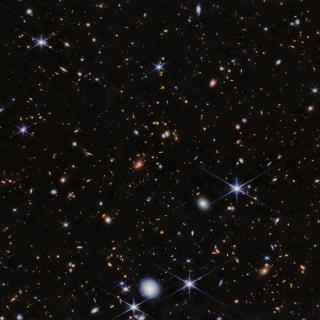Last week the sixth edition of the summer course "Astronomy Education Adventure in the Canary Islands", coordinated by the IAC and NUCLIO, was held in virtual format with the participation of more than 170 teachers from 40 countries.
Since 2015, the Instituto de Astrofísica de Canarias (IAC), together with several educational institutions, has been organising an international summer course for teachers with the aim of showing them the potential of Astronomy to awaken interest in the STEAM areas (Science, Technology, Engineering, Arts and Mathematics), as well as providing them with the tools and knowledge to carry out research projects with their students, encouraging critical thinking and the development of scientific and technological skills.
The 2020 edition was to be held at the IAC's facilities in Tenerife and La Palma, but due to global mobility restrictions related to the COVID-19 pandemic, it was decided to organize it in a virtual mode. The course took place from 20 to 24 July, in morning and afternoon sessions taught live using videoconferencing software. This format has allowed the participation of a high number of teachers from all over the world: about 170 attendees connected to the online sessions and a dozen more have followed the training through recordings and the virtual campus. This is the edition that has had the most participants and also the most international one, since the attendees come from 40 countries from four continents (Europe, Africa, America and Asia). In the five previous editions, a total of 140 educators from 12 countries, almost all European, have been trained.
The opening session was presented by the course coordinators, Nayra Rodríguez Eugenio and Rosa Doran, and included a speech by the IAC's Deputy Director, Casiana Muñoz Tuñón, who welcomed the participants and highlighted the importance of the teachers' work in getting new generations interested in science and seeing it as a tool for the joint progress of society.
Exploring other worlds from the classroom (or from home)
The central theme of the training was the "Exploration of stars and other worlds". Lectures have been given on the stars and the planets that orbit them, how these objects are detected, how their properties are studied and what the latest advances are in these fields of Astrophysics. Furthermore, through workshops and practical activities, the necessary tools and knowledge have been presented so that teachers can develop scientific projects with their students that allow them to discover exoplanets, variable stars or supernovae, as well as investigate these objects from their own observations with robotic telescopes or using archive images obtained with the telescopes of the Observatories of the Canary Islands or with the ESA's space missions.
Robotic telescopes: online Astronomy Labs
The training is part of the IAC's Educational Project with Robotic Telescopes (PETeR), which enables the Spanish educational community to carry out its own research on the Universe using professional robotic telescopes, such as the Liverpool Telescope at the Roque de los Muchachos Observatory or the Las Cumbres Observatory telescopes at the Teide Observatory and five other locations around the world. Teachers have learned to program observations with these telescopes, as well as to use astronomical image viewing and analysis programs specially developed for educational use.
In addition, the robotic telescope projects National Schools’ Observatory (NSO) and Faulkes Telescope Project (FTP), open to UK-Ireland and international schools respectively, were presented.
Organizers
The course was organized by the IAC's Outreach and Communication Unit in collaboration with the Núcleo Interactivo de Astronomia (NUCLIO, Portugal), the FTP and NSO projects (United Kingdom) and the educational initiatives CESAR - Cooperation through Education in Science and Astronomy Research (ESAC, ESA-INTA-ISDEFE, España) and "CosmoLAB: El Sistema Solar como laboratorio en el aula” (IAC, Tenerife , all of which are institutions and projects aimed at promoting interest in science among schoolchildren through astronomy and related areas. It has been organized in the framework of the European School Innovation Academy courses and has been partially funded by the European project Our Space Our Future.
The participants have had the opportunity to get to know and practice with some of the educational resources developed within the framework of these projects, which broadens the range of tools and resources presented, in addition to those of the PETeR project.
The people who have made this training possible are the following:
Coordinators, speakers, tutors and moderators: Nayra Rodríguez (IAC) and Rosa Doran (NUCLIO)
Speakers, tutors and moderators: Fraser Lewis (NSO, FTP), Sandra Benítez (IAC), Beatriz González (CESAR) and Michel G. Breitfellner (CESAR)
Speakers: Héctor Socas (IAC) and Felipe Murgas (IAC)
Technical and organisational support: Ana Costa (NUCLIO), Gustavo Rojas (NUCLIO) and Diego Sierra (IAC)
Audiovisual support: Inés Bonet (IAC) and Iván Jiménez (IAC)
Social media support: Teresa Direitinho (NUCLIO), Iván Jiménez (IAC), Alejandra Rueda (IAC) and Aarón García (IAC)
More information:
- Course website (in Spanish)
- Press release: “The International Summer Course for teachers celebrates its sixth edition in 'online' format”
Previous editions:
Contact: Nayra Rodríguez Eugenio (nre [at] iac.es (nre[at]iac[dot]es), peter [at] iac.es (peter[at]iac[dot]es))
